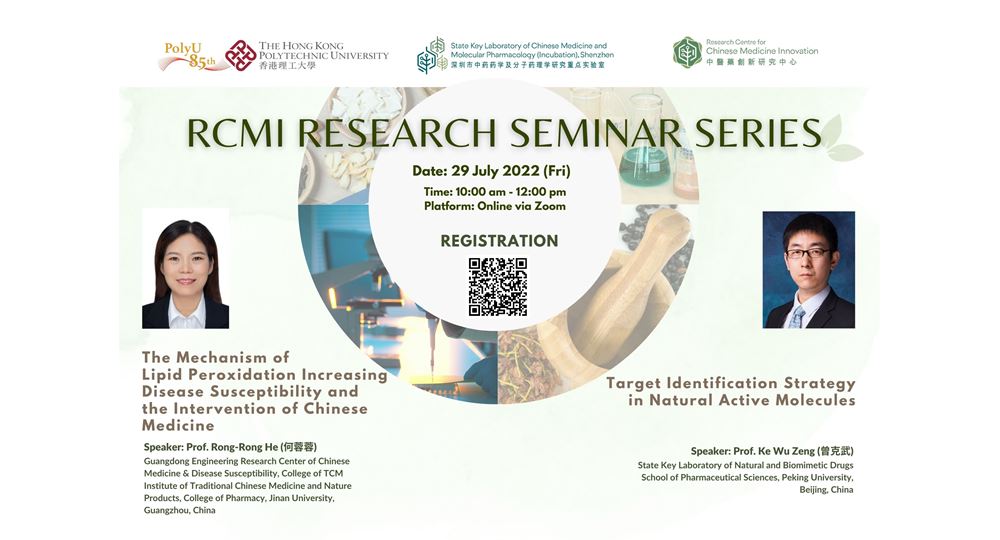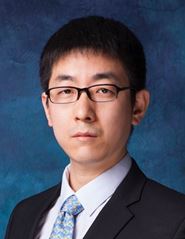RCMI Research Seminar Series - Forum on Development and Innovation of Traditional Chinese Medicine

-
Date
29 Jul 2022
-
Organiser
Research Centre for Chinese Medicine Innovation
-
Time
10:00 - 12:00
-
Venue
online via ZOOM
Speaker
Prof. Rong-Rong He (何蓉蓉)
Dr Ke-Wu Zeng (曾克武)
Enquiry
Miss Ceci Chan 3400 3879 info.rcmi@polyu.edu.hk
Keynote Speaker

Prof. Rong-Rong He (何蓉蓉)
Guangdong Engineering Research Center of Chinese Medicine & Disease Susceptibility, College of TCM; Institute of Traditional Chinese Medicine and Nature Products, College of Pharmacy, Jinan University, Guangzhou, China
Dr. Rong-Rong He (何蓉蓉), is the Professor Jinan University, Guangdong Province Universities and Colleges Pearl River Distinguished Professor. Prof. He is the Vice Dean of TCM College and Associate Director in the Institute of Traditional Chinese Medicine and Natural Products, College of Pharmacy, Jinan University. She also serves as the Director of Guangdong Engineering Research Center of Chinese Medicine & Disease Susceptibility. She is an associate editor of Phytomedicine and Phytomedicine , editor of Phytomedicine , etc. She was selected for the National Science Foundation for Distinguished Young Scholars (2021), National Science Foundation for Excellent Young Scientists of China (2016) and other talent projects. Her research interests focus on stress increases the disease susceptibility by inducing oxidative stress and chronic inflammation. The research performed by Prof. He’s lab uncovers specific pathways and key enzymatic targets of oxidative lipid metabolism, providing new insights into mechanisms of cell death of neurons and immune cells. Based on those discoveries, Prof. He’s lab effectively discloses the pharmacological activities and mechanisms of TCM formula and herbs. She has published more than 100 SCI papers in international high-level journals, such as Phytomedicine , etc. This series of novel research projects are supported by dozens of funding sources such as National Natural Science Foundation of China, Key Research Items from the Ministry of Science and Technology of China, and Major New Drug Creation program of the Ministry of Science and Technology. She has been granted 20 patents, including one of which was awarded the 17th China Patent Excellence Award by the China National Intellectual Property Administration as the first complete person. Her scientific research achievements have won many government science and technology awards, such as the First Prize of Guangdong Province Science and Technology Progress Award, the Second Prize of Science and Technology Progress of Higher Education Institutions of the Ministry of Education, the Ding Ying Science and Technology Award of Guangdong Province, the Guangdong Youth May Fourth Medal and other awards. Meanwhile, the results of one innovative research was selected as one of the top ten advances in Chinese medicine in 2021. Her personal academic impact was selected for the Top 2% of Global Scientists (2020) and Top 100,000 Global Science (2021) lists jointly published by Stanford University and Elsevier Publishing Group.

Dr Ke-Wu Zeng (曾克武)
State Key Laboratory of Natural and Biomimetic Drugs, School of Pharmaceutical Sciences, Peking University, Beijing, China
Dr Ke-Wu Zeng (曾克武) is currently working as a professor in School of Pharmaceutical Sciences, Peking University. Zeng has been selected as high-level Talents Program in Chinese Ministry of Education. His research interests mainly focus on the pharmacological target identification of bioactive natural products from traditional medicine. Zeng has published about 50 papers including PNAS, Sci Adv, ACS Cent Sci, ACS Nano, STTT. His researches have been reported by NSFC and ScienceNet, and selected as China’s Top Ten Medical Advances for 2017. Zeng has received several science and technology awards from Chinese Ministry of Education and CAITWM. He has managed 12 research projects such as NSFC, NKRDP, and international research cooperation programs. Zeng has obtained 10 invention patents with authorization or acceptance. Moreover, Zeng is taking on the positions of academic duties in World Federation of Chinese Medicine Societies and Chinese pharmacological society.
Abstract

The Mechanism of Lipid Peroxidation Increasing Disease Susceptibility and the Intervention of Chinese Medicine (Speaker: Prof. Rong-Rong HE)
Phospholipid peroxidation of polyunsaturated fatty acids at the bis-allylic position is a driving factor of ferroptosis and has been known to participate in multiple pathological processes in many diseases. The research in our lab focuses on the physiopathological activities of peroxidized phospholipids with the aid of LC-MS-based redox lipidomics. In general, we have discovered that the oxidized phospholipid products played a major role in cell death and inflammatory immune response in various conditions. Firstly, we identified the oxidized phospholipid, 1-steaoryl-2-15-HpETE-sn-glycero-3-phosphatidylethanol-amine (15-HpETE-PE), as a key eat-me signal on ferroptotic cell surface. Through ligand fishing, lipid blotting, and cellular thermal shift assay, TLR2 was screened out and identified as a 15-HpETE-PE interacting membrane receptor. This interaction navigated the phagocytosis of ferroptotic cells by macrophages (Cell Death Differ. 2021, 28(6):1971-1989). Furthermore, we demonstrated that Ca2+-independent phospholipase A2β (iPLA2β, encoded by PLA2G6 or PNPLA9 gene) preferentially hydrolyzed 15-HpETE-PE. Its mutations resulted in a significant decrease of selective 15-HpETE-PE-hydrolyzing activity and thus lead to the accumulation of 15-HpETE-PE in the midbrains of patients and animal models suffering from Parkinson’s diseases (Nat Chem Biol. 2021, 17(4):465-476). Since autophagy is implicated in neurodegenerative diseases and other types of diseases, we are now working on the novel role of phospholipid peroxidation in the regulation of autophagy. Inspiring, it is discovered to inhibit autophagy process by stimulating ATG4B-mediated delipidation of peroxidized LC3-PE. In conclusion, we proposed that phospholipid peroxidation could be a generic mechanism involved in various physiopathological conditions and is a promising therapeutic targets of TCM formula.



